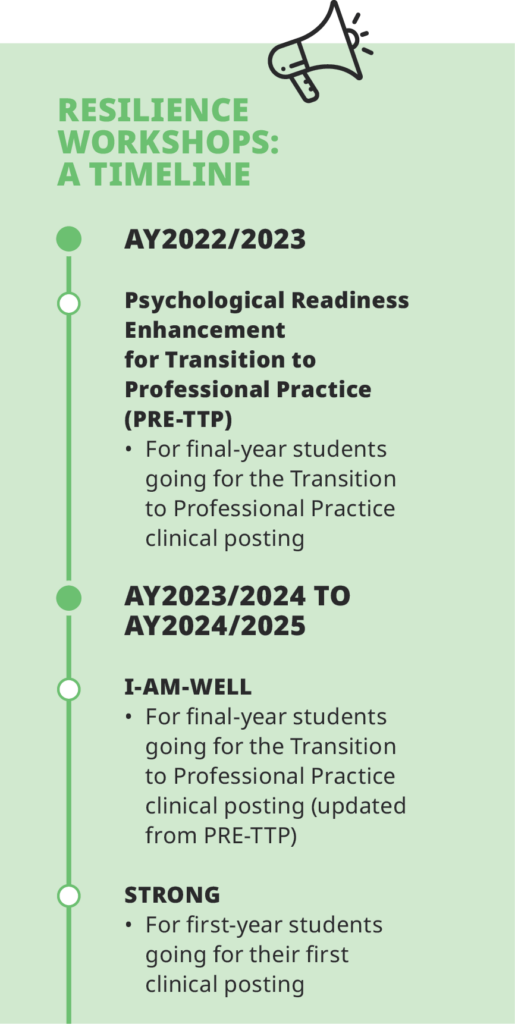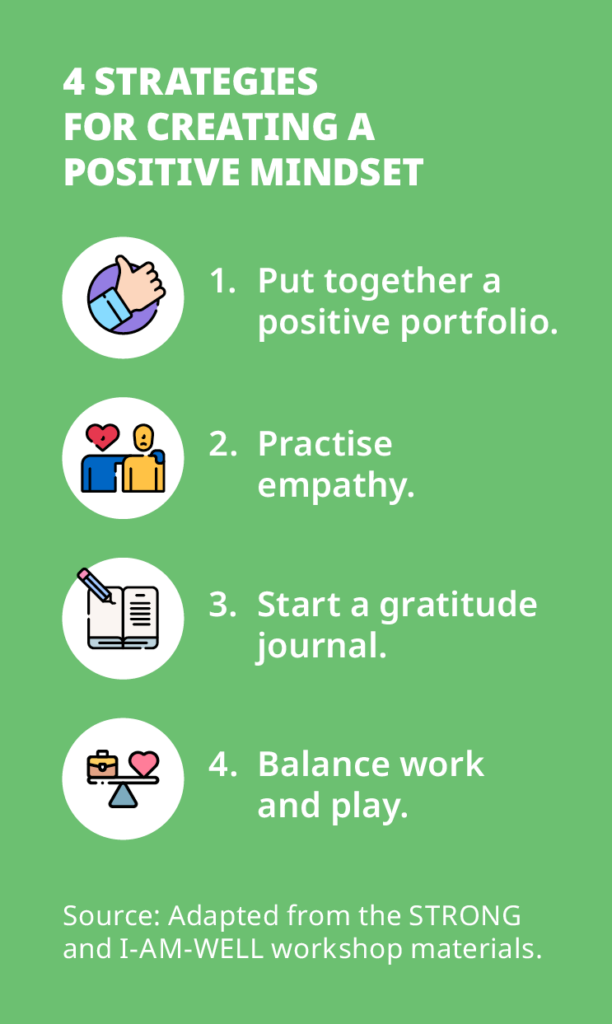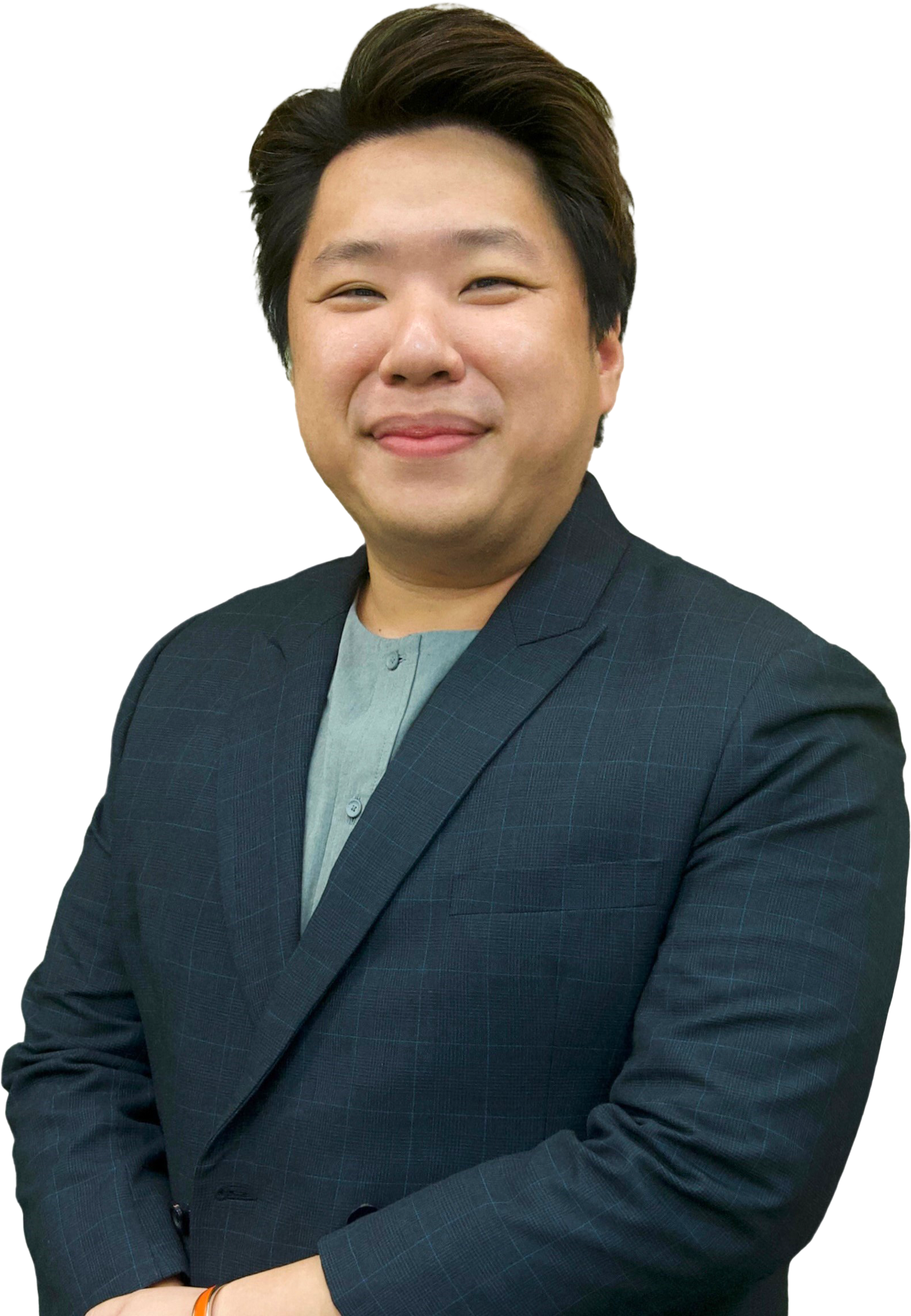
Students with high resilience have greater well-being and better academic performance[1]—but can resilience be taught? To Dr Darryl Ang, Research Fellow at the Alice Lee Centre for Nursing Studies (NUS Nursing), National University of Singapore Yong Loo Lin School of Medicine—the answer is a definite ‘yes’.
Encountering fast-paced clinical environments for the first time can be stressful for first-year Nursing students. Similarly, expectations for final-year Nursing students to take cases and perform at the level of Registered Nurses in their final clinical posting is not for the faint-hearted.
Noticing these common stress points, Dr Ang piloted a series of workshops aimed at helping NUS Nursing students develop greater resilience and overcome challenges faced during clinical postings. NUrSing sat down with Dr Ang to find out more about this recent addition to the NUS Nursing undergraduate experience.
NUrSing: First off—isn’t resilience innate? How can it be taught?
Dr Ang: That’s a good question. Some of the students I interviewed for my research said the same thing about resilience. ‘Can learn meh?’ or ‘Either you have it or you don’t.’ But increasingly, research shows that everyone is born with some form of resilience potential[1]—which can be affected by various factors such as support networks and access to resources.
NUrSing: What sparked your interest in resilience?
Dr Ang: I used to work in the oncology unit, and a cancer diagnosis can be very hard for patients and their families to take in. But over time I began to observe that while some patients had a severe mental breakdown, others accepted the news calmly. This led me to wonder—what was it that enabled some to be more resilient than others?
And not just patients—I was seeing these same distinct differences in the Nursing students I mentored. Some would start crying when I give my feedback. So when I eventually went on to do my PhD at NUS Nursing, I decided to work on developing a resilience programme for young adults.
NUrSing: How did the idea of a resilience workshop for NUS Nursing students come about?
The first run, Psychological Readiness Enhancement for Transition to Professional Practice (PRE-TTP), was targeted at final-year students who were about to go for their Transition to Professional Practice (T-to-P) clinical posting. We chose this group of students because T-to-P is a very stressful and demanding posting for most students (even for myself when I was one). Most students pass their T-to-P stints. But there’s no telling whether they would make it through smoothly or experience distress. That’s where the programme tries to make a difference by enhancing their psychological readiness.

NUrSing: How did you tweak your original programme for this?
Dr Ang: I drew on the findings from my PhD study, Resilience Skills Enhancement (RISE), to inform PRE-TTP’s design and development. For example, in RISE I tested having model students share strategies for coping with academic stress and study tips. It was well-received with participants showing good improvements over time.
But since PRE-TTP is meant for a more specific group of Nursing students, I used the same strategy but adapted the contents to be more relevant for T-to-P posting. Instead of general academic advice, NUS Nursing alumni from different specialities share their tips for surviving T-to-P and their perspectives as preceptors instead.
NUrSing: Since conducting PRE-TTP, you have finished another round of the resilience workshops in the latest academic year.
Dr Ang: Yes. This time round, we curated a new programme for final-year students called I-AM-WELL based on feedback from PRE-TTP participants. We also added another programme for first-year students going on their first clinical posting—STRONG. Entirely new to the clinical environment, it is not unusual for them to be anxious about their ability to perform well.
Then building on the feedback I got from PRE-TTP participants who expressed preference for a more self-paced style, I refined and condensed the I-AM-WELL and STRONG programmes to an asynchronous online format where students could log in on their own time to complete the workshop. Comparatively, PRE-TTP was a blended learning workshop with both face-to-face and online components.
Another programme enhancement is the incorporation of more experiential sharing in the form of infographics and short videos. We even created cue cards that the students could bring along and refer to during their postings.
NUrSing: What are some key differences between STRONG and I-AM-WELL?
Dr Ang: The basic resilience skills are similar, but the focus of each workshop is tailored to different students. For first-year students in STRONG, the focus is specifically on preparing for first posting, strategies for surviving community hospital settings and so on.
Whereas for final-year students in I-AM-WELL who already know what to expect at clinical postings, they would instead learn tips for taking cases independently and things to note for diverse specialisations like cardiology and orthopaedics.
NUrSing: Now that you’ve done two pilot rounds, what’s next for the resilience workshops?
Dr Ang: The intention is to formally incorporate the resilience workshops into the curriculum from 2025. Concurrently, we are also looking into creating programmes targeted at second- and fourth-year NUS Nursing students.
We recognise that resilience is dynamic—fluctuating through different life stages. Similarly, Nursing students face specific challenges at each stage of their study. For example, second-year students may have more familiarity with the clinical setting, but this is also the point where they are exposed to multiple clinical specialities—which comes with its own challenges.
By offering students resilience ‘booster shots’ at various points of their NUS Nursing journey, the hope is that we can tackle these common stressors—and help them develop skills and cognitive flexibility required for challenges of the Nursing profession.
“The workshop prepared me in terms of what to expect and the importance of self-care and stress management. I felt more confident going for clinical postings reassured that I’m not facing this alone.”
—Student Participant, STRONG

[1] Ang, W. H. D., Shorey, S., Zheng, Z. J., Ng, W. H. D., Chen, E. C. W., Shah, L., … & Lau, Y. (2024). Evaluating the online Resilience Skills Enhancement programme among undergraduate students: A double‐blind parallel randomized controlled trial. Stress and Health.
[1] Szanton, S. L., & Gill, J. M. (2010). Facilitating resilience using a society-to-cells framework: a theory of nursing essentials applied to research and practice. Advances in Nursing Science, 33(4), 329-343.



